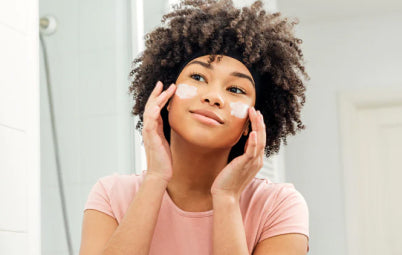If you read our recent article ‘What are dark spots/sun spots, and how can I treat them?’, you may be wondering about the best products to invest in to treat dark spots. We’re giving the low-down on all of the hyperpigmentation products recommended by our Face Dr Skin Experts, so you can make the most informed choice on your skincare options.
Let’s talk about sun spots, how best to treat them, and the products you’ll want to have handy for the very best results.
If you’d rather skip straight to speaking with a professional about dark spots and hyperpigmentation, you can book a free chat with one of our Skin Experts here:
- What are dark spots/sun spots?
- How do they occur?
- How do I get rid of sun spots?
- What ingredients work best?
- What products should I invest in?
- What kind of SPF do I need for long-term prevention?
- How long before sun spots start to fade?
- Summary: Should I invest in skincare to fade hyperpigmentation?
What are dark spots/sun spots?

Dark spots and sun spots are essentially the same thing, and they have a lot of other names too; age spots, liver spots, or hyperpigmentation to name a few. These all fall under the same umbrella, and appear as small patches of skin on the face that look darker than your natural skin tone.
Why do I have sun spots?
If you’re sure you have sun spots (and not just freckles, which are different!) then there are a number of reasons these might have appeared over time. They tend to show up when too much ultraviolet light causes skin on the face to overproduce melanin, which is a pigment that gives skin its colour. If you have experienced a lot of sun exposure over the years you may be more likely to see dark spots on your skin, which is why those who regularly use tanning beds are the most likely to notice dark spots.
Ageing is also a factor when it comes to dark spots, because the older you are the more years of sun exposure you have experienced. Plus, dark spots can also be caused by skin damage, such as acne scars, small cuts or burns, hair removal products, harsh skincare products, ingrown hairs, or scars from previous skin conditions.
How do I get rid of sun spots?

If you’re looking to fade any dark spots on your skin in order to achieve a brighter, more even complexion, there are certain ingredients, prescription medicines and in-clinic treatments that can help. Over time, these spots grow weaker and can eventually disappear.
If you’re looking for over-the-counter products to fade dark spots, there are many options which make use of effective active ingredients like retinoids, azelaic acid, and vitamin C. All these ingredients are known for fading hyperpigmentation, so in trying some out you may notice they make a difference to your skin.
In-clinic treatments are also an option to reduce dark spots, such as chemical peels, intense pulsed light (IPL), LED light therapy, and microdermabrasion. You can read more about these options in our article; The best in-clinic treatments for hyperpigmentation
What ingredients work best?
At Face Dr, we prescribe specific treatments to help with your skin concerns, and our Skin Experts regularly recommend a number of high-strength products with ingredients carefully chosen to help with hyperpigmentation. A few stand-out ingredients include:
Kojic acid
Derived from the fungus created when rice is fermented, this ingredient helps to block the production of the tyrosine enzyme, which is needed for melanin to form. Without it, the appearance of hyperpigmentation fades.
Glycolic acid

An AHA that acts like a chemical peel to exfoliate skin by breaking down the molecules holding dead skin cells together. By doing this, a lighter, brighter complexion is revealed. These products are available over the counter in weaker concentrations, but stronger glycolic acid products (like the ones we stock) can penetrate the deeper layers and reduce more stubborn dark spots.
Hydroquinone
A superstar ingredient when it comes to fading hyperpigmentation, hydroquinone was originally available in over-the-counter products but is now prescription-only as high concentrations can cause irritation for some people. This skin-lightening ingredient is a strong inhibitor of melanin production and works to fade hyperpigmentation by actively destroying cells that produce pigment. You can read more about hydroquinone here or learn more about ingredients that help reduce dark spots here.
If you want to start using any of the above ingredients, you will need to speak to a professional through an authorised stockist in order to receive a prescription - our Skin Experts at Face Dr can help with this.
What products should I invest in?

When it comes to products that fade dark spots, we have a range of prescription options to suit your skin needs. Some of our bestselling individual products include:
- ZO Brightalive® Skin Brightener (Non-hydroquinone, non-retinol for sensitive skin)
- ZO Radical Night Repair - (Contains 1% retinol)
In addition, we have hydroquinone options, available on prescription-only.
ZO Skin Health Brightening System

Created to treat hyperpigmentation and improve brightness, the 5-step system contains a number of highly effective products that work together to create amazing results for clients. This system does not use hydroquinone, but does contain a number of other skin brightening ingredients to improve your complexion. While not as effective on stubborn dark spots as the Obagi range above, it’s a great option for those with sensitive skin who would like similar results without the intensity of hydroquinone.
“This is a very good brightening system. I was told I might get a little redness at first. I've not had any, my skin looks a lot brighter and clearer…”
Tracey P, Face Dr client using the ZO Skin Health Brightening System
You can read more in our article ‘How to treat hyperpigmentation with your skincare routine’
What kind of SPF do I need for long-term prevention?

A full spectrum SPF product is a must when you are using hydroquinone products. This ingredient is known to make skin more sensitive to sun, but regardless of the ingredients in your hyperpigmentation product we always encourage our clients to use an SPF product in order to protect skin long-term and prevent the development of new sun spots.
Our Skin Experts can also recommend products such as:
- ZO Skin Health Smart Tone Broad-Spectrum SPF 50
- ZO Skin Health Broad Spectrum SPF 50
- ZO Skin Health Daily Sheer Broad-Spectrum SPF 50
- ZO Skin Health Sunscreen + Primer SPF 30 (leaves a primer-like finish)
- ZO Skin Health Sunscreen + Powder SPF 30 (tinted with Light, Medium and Deep shades)
Our sunscreens use high quality ingredients to provide the ultimate daily protection without the white finish or sticky feeling, and are considered more protective than high street sunscreens, providing full spectrum protection. This means the products protect against UVA and UVB rays, IRA rays (infrared) and HEV light (high-energy visible light).
How long before dark spots start to fade?
Like with any new skincare routine, it takes time before results become noticeable, so expect to continue with your new regime for around 4-6 weeks at least for the active ingredient to take effect. You should start to see improvements after the first month, but continued use for several months after could see further results.
“Just 3 weeks of using the Obagi system and already my skin tone has improved significantly.”
- Helen W, Face Dr client using the Nu-Derm® Skin Transformation System
Summary: Should I invest in skincare to fade hyperpigmentation?
If your dark spots bother you and you would like to fade them for a more even complexion, there are many treatment options available to help. It’s always best to speak to a professional before starting a new skincare routine, and you will be required to do this if you would like to begin using a prescription treatment - these are usually the most effective when used consistently.
Face Dr is an authorised stockist of many prescription treatment options, and you can speak to our Skin Experts for free on a secure video link to chat about any concerns you have when it comes to dark spots and hyperpigmentation. Then, they can advise on the best products for you and prescribe the appropriate ones. This may be from the ranges we stock at Face Dr, however our Skin Experts always give completely unbiased advice about what will work best, so if we think another product that we don’t stock would be of more use to your particular skin concern, we’ll always let you know.
If you do want to purchase a product from our ranges, your prescribed product will be unlocked on our website for you to buy (although you will never be under any pressure to do so!). Then, we’ll post it to you next working day delivery anywhere in the UK.
Ready to chat with one of our Skin Experts?
Want to read more about hyperpigmentation? Click the blog posts below:











